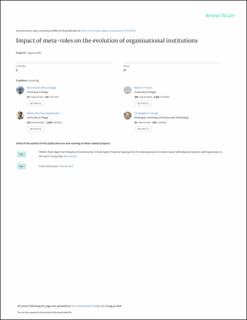| dc.contributor.author | Afshar Sedigh, Amir Hosein | |
| dc.contributor.author | Purvis, Martin K. | |
| dc.contributor.author | Savarimuthu, Bastin Tony Roy | |
| dc.contributor.author | Purvis, Maryam A | |
| dc.contributor.author | Frantz, Christopher | |
| dc.date.accessioned | 2022-11-18T09:28:46Z | |
| dc.date.available | 2022-11-18T09:28:46Z | |
| dc.date.created | 2021-02-02T10:53:37Z | |
| dc.date.issued | 2021 | |
| dc.identifier.isbn | 978-3-030-66888-4 | |
| dc.identifier.uri | https://hdl.handle.net/11250/3032766 | |
| dc.description.abstract | This paper investigates the impact of changes in agents’ beliefs coupled with dynamics in agents’ meta-roles on the evolution of institutions. The study embeds agents’ meta-roles in the BDI architecture. In this context, the study scrutinises the impact of cognitive dissonance in agents due to unfairness of institutions. To showcase our model, two historical long-distance trading societies, namely Armenian merchants of New-Julfa and the English East India Company are simulated. Results show how change in roles of agents coupled with specific institutional characteristics leads to changes of the rules in the system. | en_US |
| dc.language.iso | eng | en_US |
| dc.publisher | Springer | en_US |
| dc.relation.ispartof | Multi-Agent-Based Simulation XXI | |
| dc.title | Impact of Meta-roles on the Evolution of Organisational Institutions | en_US |
| dc.type | Chapter | en_US |
| dc.description.version | submittedVersion | en_US |
| dc.source.pagenumber | 66-80 | en_US |
| dc.identifier.doi | 10.1007/978-3-030-66888-4_6 | |
| dc.identifier.cristin | 1885760 | |
| cristin.ispublished | true | |
| cristin.fulltext | preprint | |
| cristin.qualitycode | 1 | |
